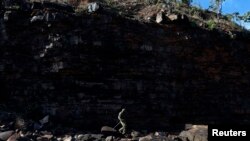Aboriginal groups have spoken of their “grief” at an Australian parliamentary inquiry into the destruction by a mining company of sacred sites dating back 46,000 years. In May, Rio Tinto, the world's biggest iron ore miner, destroyed two ancient rock shelters at the Juukan Gorge in Western Australia’s Pilbara region as part of a new development, despite fierce opposition from indigenous groups.
Indigenous groups say they are “in mourning at the desecration of our sacred site” at the Juukan Gorge. It was blown up by Rio Tinto in pursuit of high-grade iron ore despite protests by community leaders. Aboriginal witnesses have told a parliamentary committee that Aboriginal culture is “undervalued in Australia”. The ancient rock shelters destroyed in May were considered some of the country’s most significant archaeological research areas.
Greg McIntyre is a land rights expert and says tougher laws are needed.
“Governments at both state and federal level need to be actively engaged in this and to take a different view about the juxtaposition between economic benefit and Australia’s heritage. Heritage has been a very poor second cousin for decades now,” McIntyre said.
Aboriginal Australians consider the land to be the mother of creation, connecting them to their past, present and future.
An indigenous elder said his people felt “immense grief and guilt” at their failure to protect such a sanctified site at the Juukan Gorge that dated back tens of thousands of years.
Rio Tinto has apologized and is scheduled to give evidence to the inquiry later this week. Three senior Rio executives were forced to quit last month after the scandal.
New heritage laws are being drafted in the state of Western Australia to give indigenous groups a greater say in the protection of their land under the proposals. In the past, some have agreed to sacrifice sacred sites to help their impoverished communities receive a share in mining revenue.
The parliamentary inquiry is due to hand down its report in early December.




